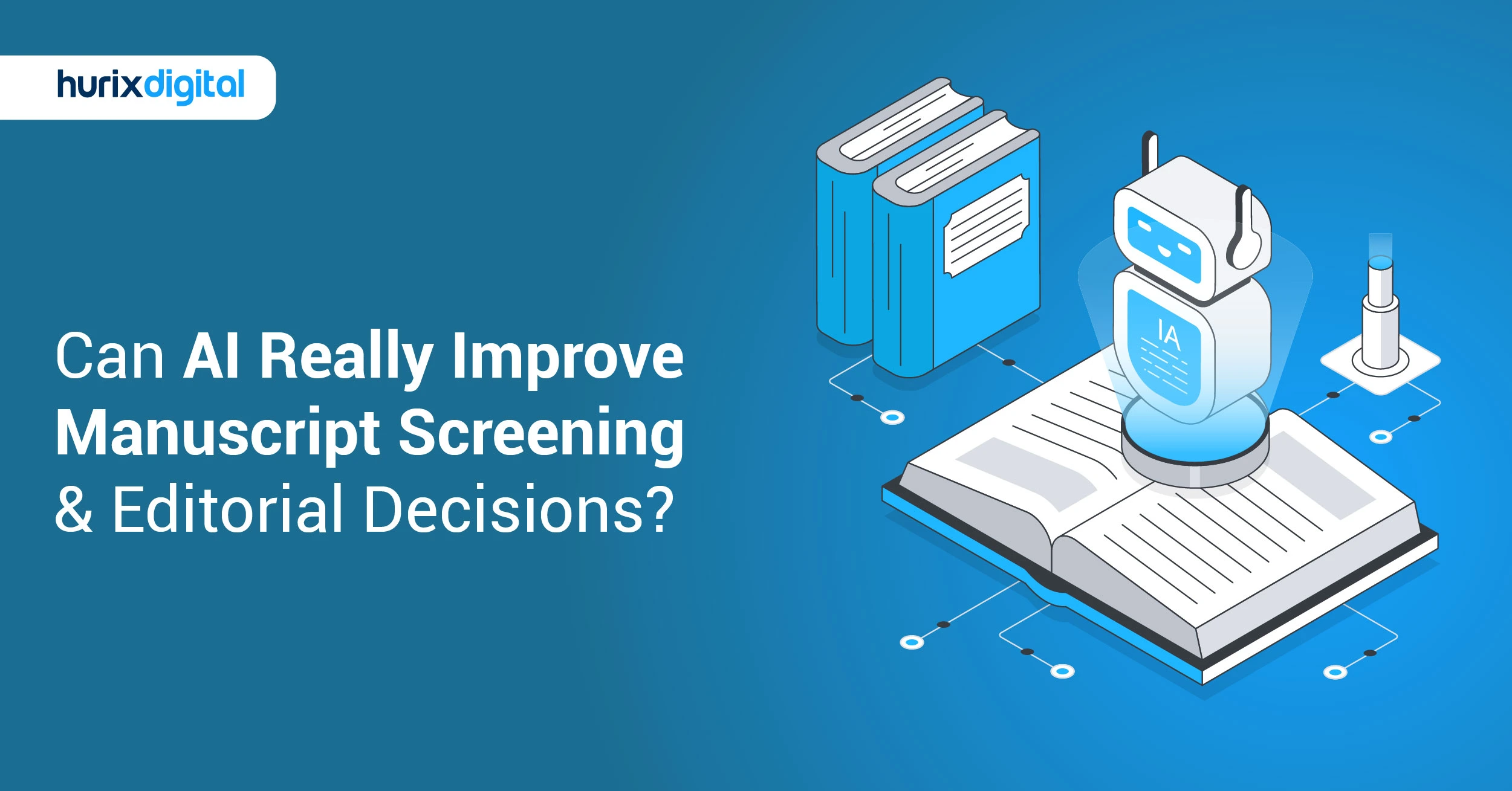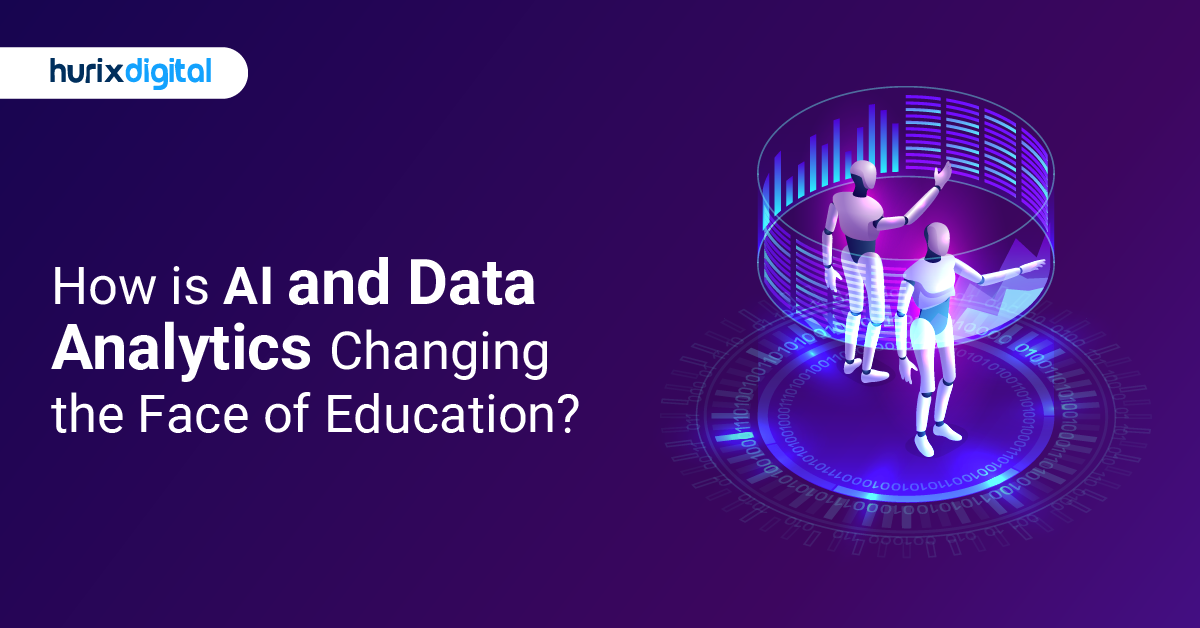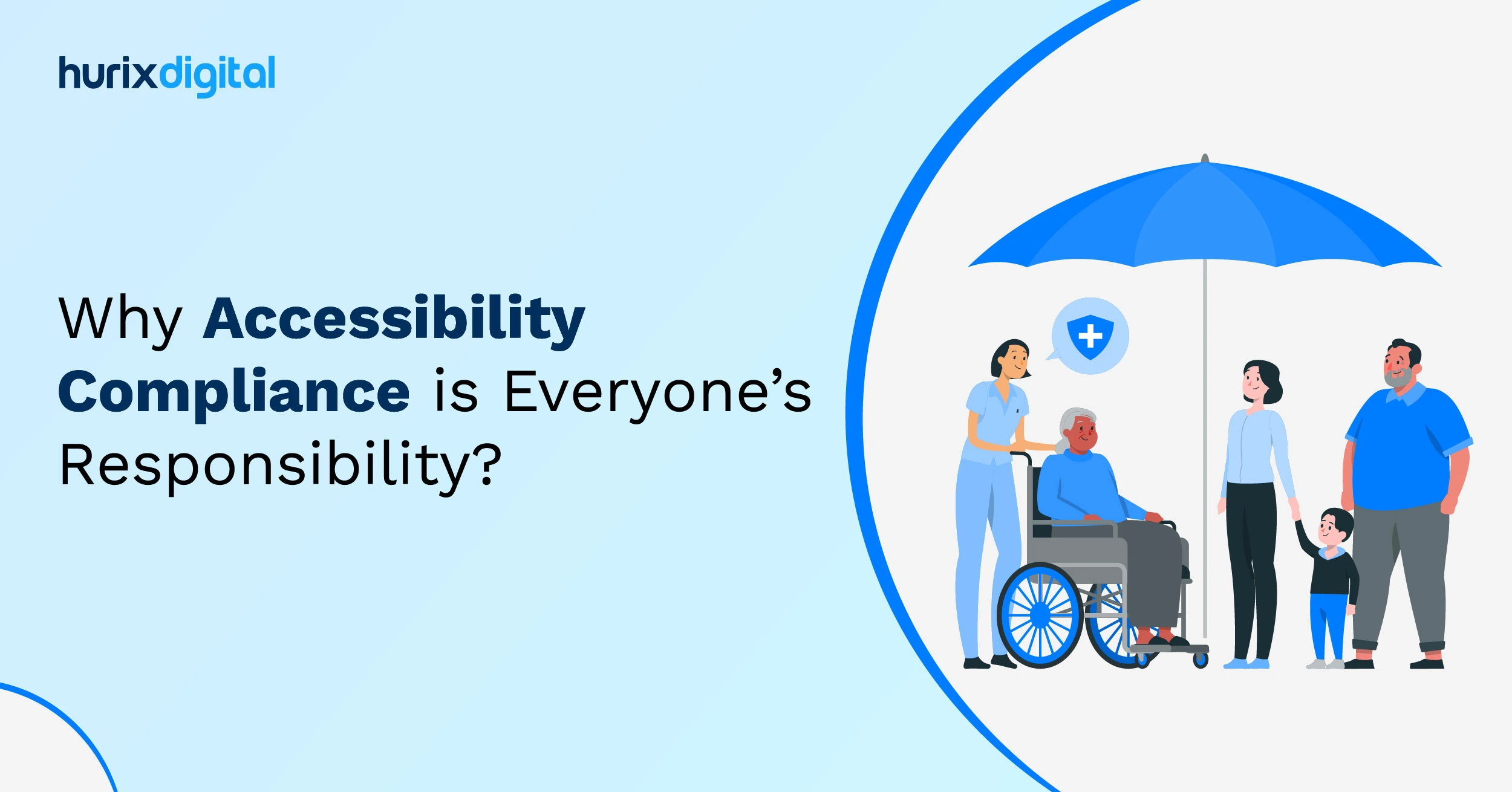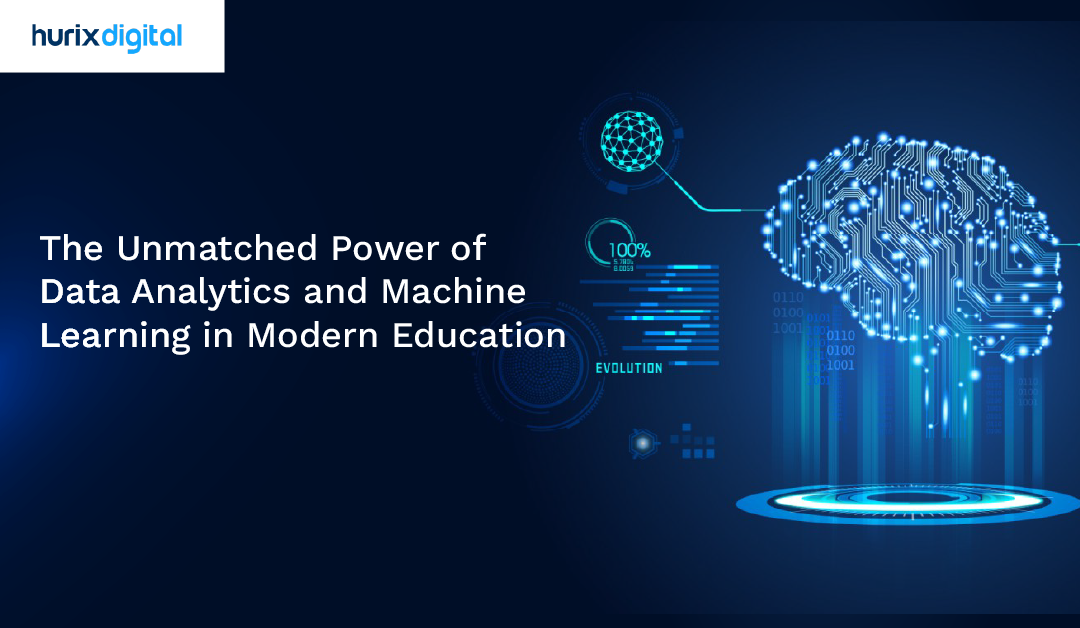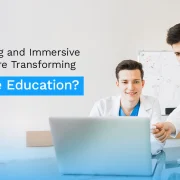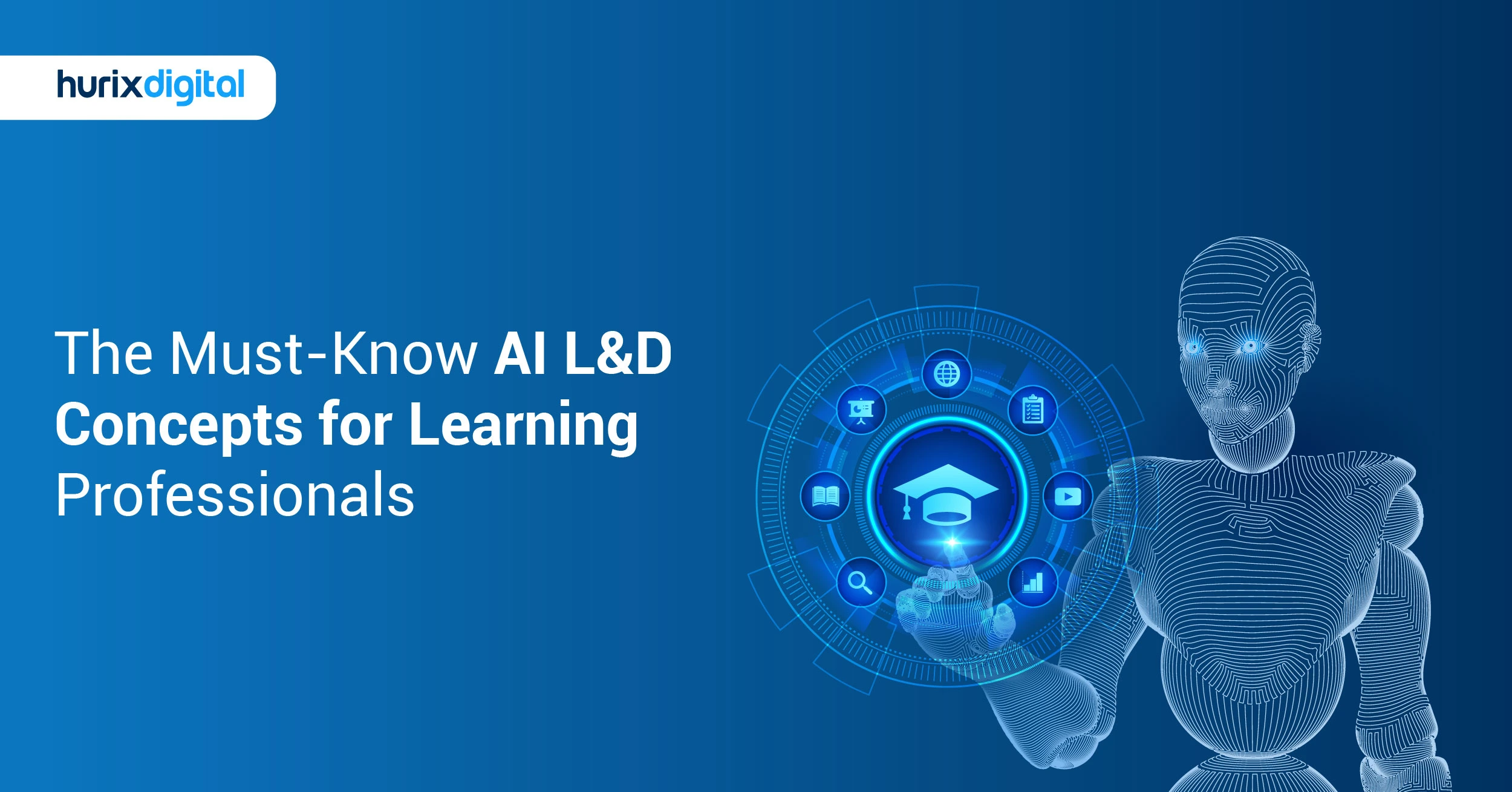
How Deep Learning is Transforming Corporate L&D?
Summary
AI is revolutionizing business strategies, employee training, and professional development. This guide explores how deep learning enhances decision-making, how AI-driven training improves workforce skills, and the key deep learning and AI concepts learning professionals need to stay ahead. Learn how organizations can leverage deep learning and AI for smarter business and workforce growth.
Artificial Intelligence (AI) has transformed the way businesses use technology to interact with their customers. By simulating the different human intelligence processes, machines can now perform tasks that require human intervention, such as decision-making, problem-solving, learning, and reasoning.
These technological developments have ushered in a new era in which AI-powered systems can gain actionable insights from large datasets, automate repetitive processes, and provide personalized experiences. The usage of AI is quite vast, from recommendation engines and customer service chatbots to autonomous vehicles.
By implementing AI in learning and development, an organization can take advantage of the growth opportunities, increased efficiency, and enhanced customer engagement that will result.
Table of Contents:
- What is Deep Learning?
- What are the Mechanics of Deep Learning?
- What is AI-based Training?
- How Can Deep Learning Be Applied in Business?
- Key AI Concepts for Learning Professionals to Improve Skill and Knowledge
- Can AI Create a Training Program?
- Final Thoughts
What is Deep Learning?
Deep Learning is a part of machine learning that uses multi-layered neural networks. These networks can simulate the complex decision-making powers of a human brain. Most of the AI we see today is powered by deep learning.
Technically speaking, a deep neural network (DNN) is a neural network with three or more layers. Most DNNs have many more layers. Large amounts of data are used to train DNNs to identify and classify phenomena, determine patterns and relationships, calculate possibilities, and make predictions and decisions.
A neural network with a single layer can make approximate predictions and useful decisions, but additional layers can help optimize and refine those outcomes for greater accuracy.
Deep learning is often applied in applications and services that improve automation, performing physical and analytical tasks without requiring human intervention. Deep learning is used in products and services we use daily, such as credit card fraud detection, voice-enabled TV remotes, and digital assistants.
It is also used in emerging technologies such as generative AI and self-driving cars. The deep learning chip market’s global revenue report shows its growing importance; it is forecasted to grow to over $20 billion in 2027.
What are the Mechanics of Deep Learning?
Deep learning models are developed using multiple layers of interconnected neurons or nodes designed to transform and process input data into meaningful outputs. Using a process known as training, the parameters of these models are adjusted to minimize the difference between their actual outcomes and their predictions. Thus, they learn from the data provided, which, with time, leads to performance enhancement.
Deep learning’s defining characteristic is the ability to automatically identify complex patterns in unstructured data, like text, images, audio, and video, without the help of explicit programming. In 2023, the clinical area of radiology accounted for 46% of the total AI and machine-learning integrated medical device market. It is expected to increase to 55% by 2025.
This kind of self-learning ability enables deep-learning models to take on complex tasks, such as anomaly detection, image recognition, language translation, and speech synthesis. These are done with a level of sophistication and accuracy that cannot be attained with conventional programming methods.
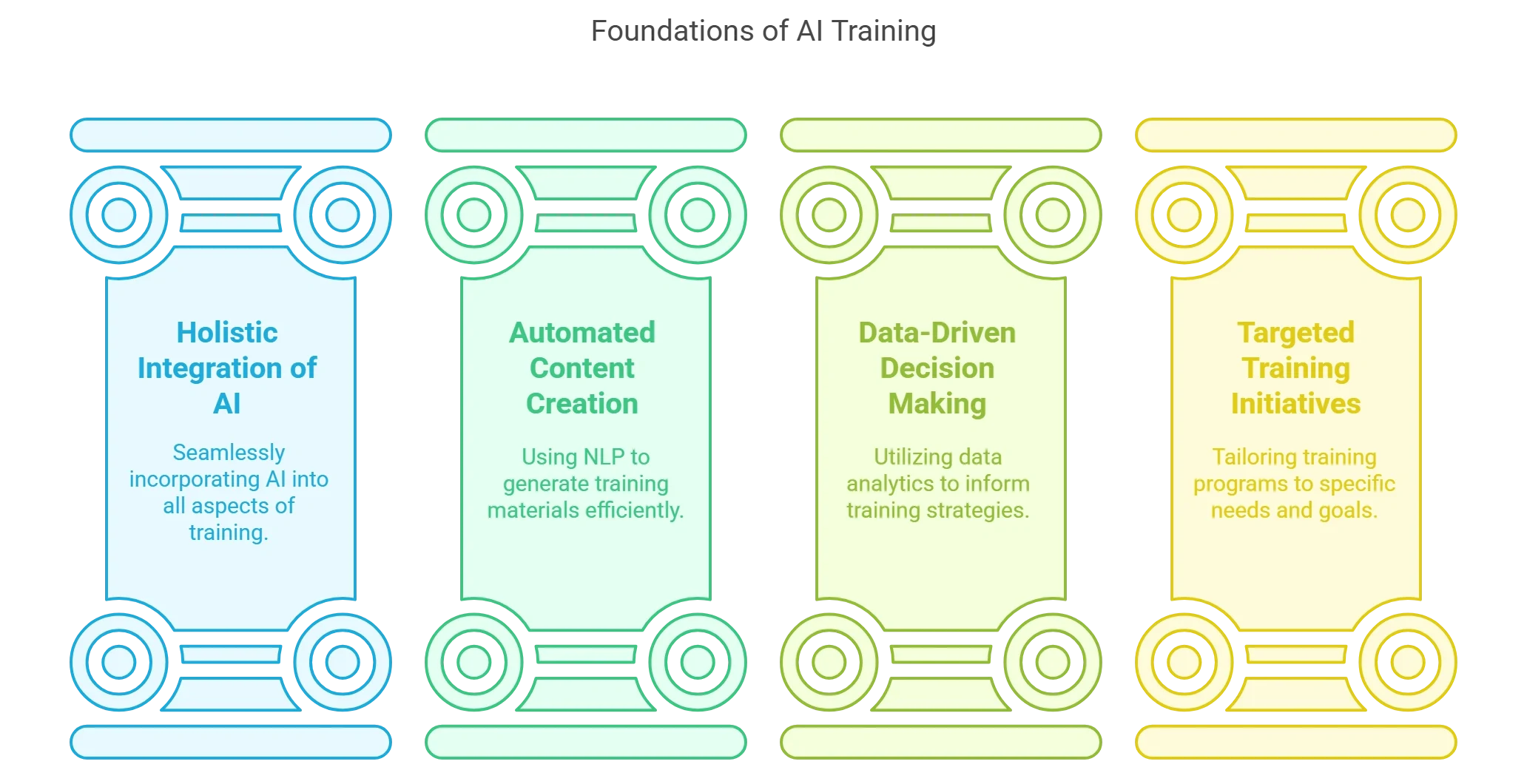
What is AI-based Training?
Exploring the essence of AI-based training reveals a seamless integration of AI technologies throughout the entire training journey:
1. Holistic Integration of AI
AI-based training encompasses the incorporation of artificial intelligence technologies across all training stages. From content creation to delivery and assessment, AI optimizes each step of the training process.
2. Automated Content Creation through NLP
Natural language processing (NLP) algorithms automate the content creation process. Training materials are generated that are comprehensive and adaptable to individual learning styles.
3. Data-Driven Decision Making
AI-based training platforms leverage machine learning algorithms to analyze vast datasets. Identifying trends and skill gaps within the organization allows HR professionals to make informed decisions.
4. Targeted and Aligned Training Initiatives
The data-driven approach ensures that training initiatives are targeted and aligned with organizational strategic goals. This alignment enhances the effectiveness of training programs, addressing specific organizational needs.
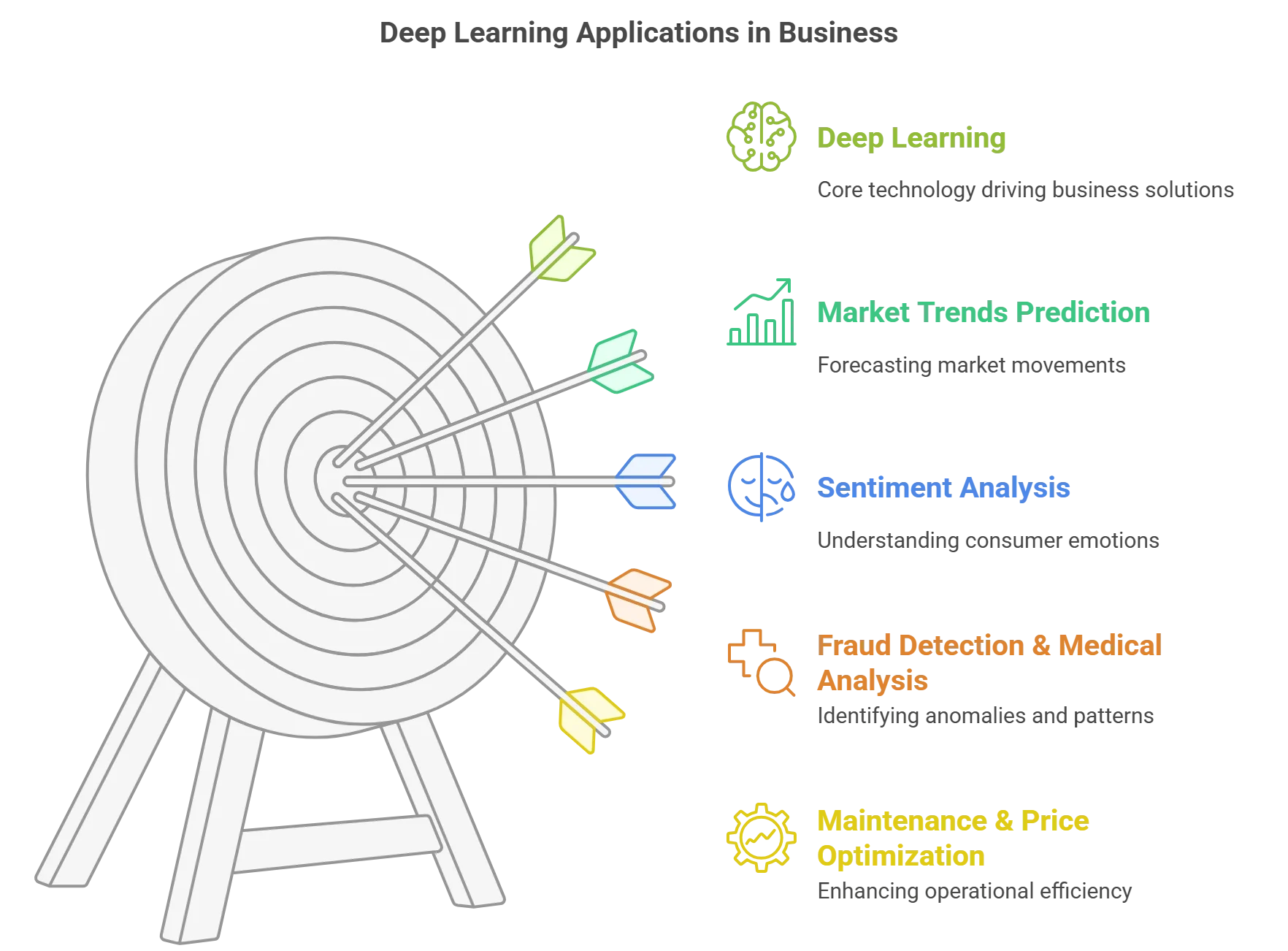
How Can Deep Learning Be Applied in Business?
Because of its adaptability and versatility, deep learning can be applied to a variety of business applications, thereby changing how organizations can leverage data for strategic decision-making:
1. Predicting Market Trends
In the area of marketing, deep learning plays a crucial role in facilitating sentiment analysis, predictive analytics, and personalized customer recommendations. This empowers companies to customize their offerings based on individual preferences and predict market trends with immense precision.
Businesses can leverage deep learning algorithms to sift through large amounts of customer data. This allows them to identify preferences, behaviors, and nuanced patterns, which helps them deliver targeted marketing messages and customized recommendations.
2. Sentiment Analysis for Consumer Strategies
Deep learning offers scope for sentiment analysis, which enables organizations to determine consumer emotions and attitudes, leading to the development of communication strategies that are more resonant and empathetic.
Furthermore, marketers can equip themselves with predictive analytics capabilities to gain a foresight that will enable them to anticipate changes in consumer demand, refine campaign targeting, and optimize pricing strategies. These, in the long run, will help drive business growth and create deeper customer engagement.
3. Fraud Detection and Medical Image Analysis
For industries like healthcare and finance, deep learning is being used to promote transformations and innovations across a wide range of business applications – from drug discovery and disease diagnosis to predictive maintenance and fraud detection.
In healthcare, deep learning algorithms are being used for medical imaging analysis. This can be used to detect diseases early and develop personalized treatment plans. Within the finance sector, anomalous patterns can be identified within large transaction datasets, thereby helping in fraud detection.
4. Optimizing Maintenance in Manufacturing
Deep learning is being applied to the field of manufacturing by optimizing processes through predictive maintenance. This also helps minimize downtime and facilitate proactive equipment upkeep.
These advancements in the field of manufacturing highlight the long-lasting impact of deep learning and how it helps to drive meaningful efficiency and progress across multiple industries.
5. Price Optimization and Sensitivity
One of the most important decisions an entrepreneur makes is determining how to price the products and services being sold. Entrepreneurs must be conscious of price sensitivity—a price change can influence the customer’s decision-making abilities.
Traditionally, businesses used surveys to determine how willing customers are to pay at different price ranges. With the help of machine learning or deep learning, a dynamic smart pricing strategy can be implemented, ensuring that the products and services are always priced appropriately as per the target audience.
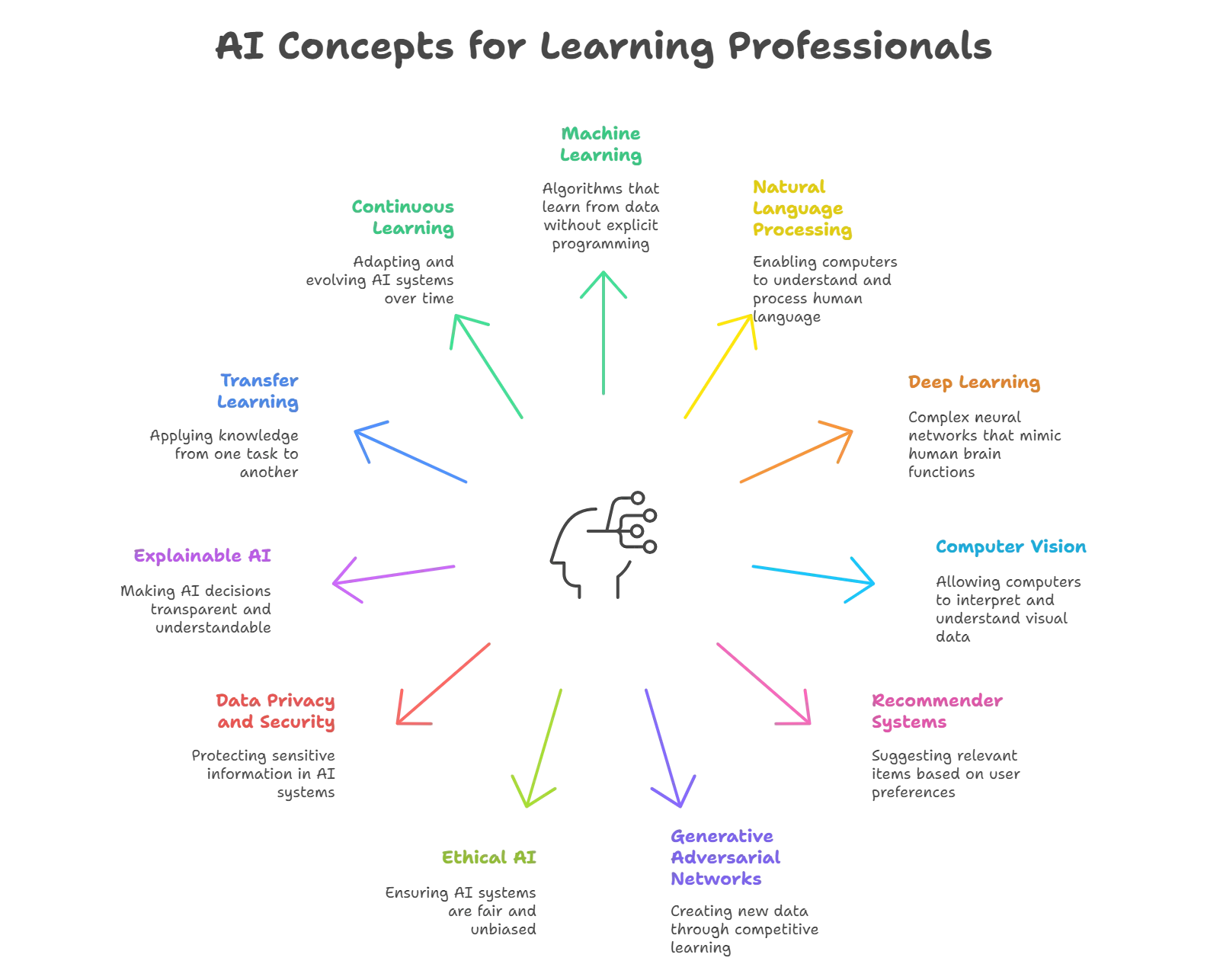
Key AI Concepts for Learning Professionals to Improve Skill and Knowledge
Here are 11 key AI concepts for learning professionals to improve their skills and knowledge.
1. Machine Learning
Machine learning lies at the heart of AI, empowering systems to learn from data and improve over time without explicit programming. Specialists in this field must understand the different types: supervised learning, unsupervised learning, reinforcement learning, decision trees, neural networks, and support vector machines, among other common algorithms.
Once you know what they are capable of doing, it becomes possible to create adaptive systems for teaching or recommendation engines for personalization that will optimize results based on predictions made by predictive analytics models using ML.
2. Natural Language Processing (NLP)
Natural Language Processing enables computers to understand human speech or writing so they can communicate with people more effectively. There are many ways educators might apply NLP.
This includes generating chatbots that respond in natural language to learner queries or analyzing large bodies of text for insight extraction towards intelligent tutoring system development. These programs would be able to understand questions learners ask and express them naturally.
3. Deep Learning
Deep learning, a branch of machine learning (ML), centers around artificial neural networks with multiple layers that allow for complex data representation. Understanding deep learning allows educators to create advanced AI applications.
Some of them are speech recognition systems, image classification algorithms, and models for natural language understanding, thus changing the way we deliver and assess content.
4. Computer Vision
Computer vision enables machines to interpret and understand visual information from their environment. With vision and cognitive computing techniques, teachers can create immersive virtual reality (VR) and augmented reality (AR) learning experiences.
Moreover, they can automatically tag and classify content and improve assessment through technologies like facial recognition or emotion detection.
5. Recommender Systems
Recommender systems use AI algorithms to analyze user preferences and behavior and give them personalized recommendations on what to consume next. Educators need to know how recommender systems work.
That is how they can design adaptive learning platforms, curated learning pathways, and targeted content delivery strategies for individual learners based on their needs and interests.
6. Generative Adversarial Networks (GANs)
GANs are made up of two neural networks: the generator and the discriminator. These networks learn by competing against each other, which helps them produce realistic synthetic data.
For example, GANs can be used in educational programs to create virtual laboratories. They can also generate training sets for unusual cases or those that require privacy. Moreover, content developers may find them useful when creating lifelike videos, texts, or images.
7. Ethical AI
AI ethics is a top concern when working with educational systems. Teachers must account for fairness issues tied to algorithmic bias as well as student privacy vis-à-vis the use of their personal information by machines.
Additionally, moral questions surround automated decision-making through AI in learning and development environments. To ensure inclusivity and gain students’ confidence in these programs, instructors need to follow ethical guidelines while being transparent about their intentions.
8. Data Privacy and Security
As AI-powered learning technologies become more common, protecting the privacy of student data and ensuring cybersecurity have become essential duties for educators.
Being aware of data protection regulations such as GDPR and implementing strong security measures can help reduce the risk of breaches or unauthorized access while keeping learners’ trust intact.
9. Explainable AI (XAI)
Explainable AI aims to make artificial intelligence models clear so that different stakeholders can easily understand how decisions were arrived at based on them.
Learning professionals should prioritize XAI techniques since they enable students to learn more about themselves through assessments made by algorithms driven by this system. This system also recommends personalized AI in learning and development materials, thus enhancing comprehension and trust in an environment where machines do everything.
10. Transfer Learning
Transfer learning refers to when the knowledge gained from one task is applied to another related task, thereby speeding up AI learning and development speed and improving how models generally work.
Resource allocation optimization and adaptation of pre-trained AI models may be necessary to match specific educational settings, among other things. Transfer learning methods can achieve this, allowing teachers to maximize knowledge sharing across different domains.
11. Continuous Learning and Adaptation
Due to the fast-changing nature of AI and education, adopting a culture of continuous AI in learning and development is important. This will help experts in the field keep up with current trends, new technologies, and best practices.
Through participating in career advancement activities, working together with different teams from various disciplines, and trying out novel methods, professionals can change their skills with the progress made by artificial intelligence, thereby fostering innovation within teaching institutions.
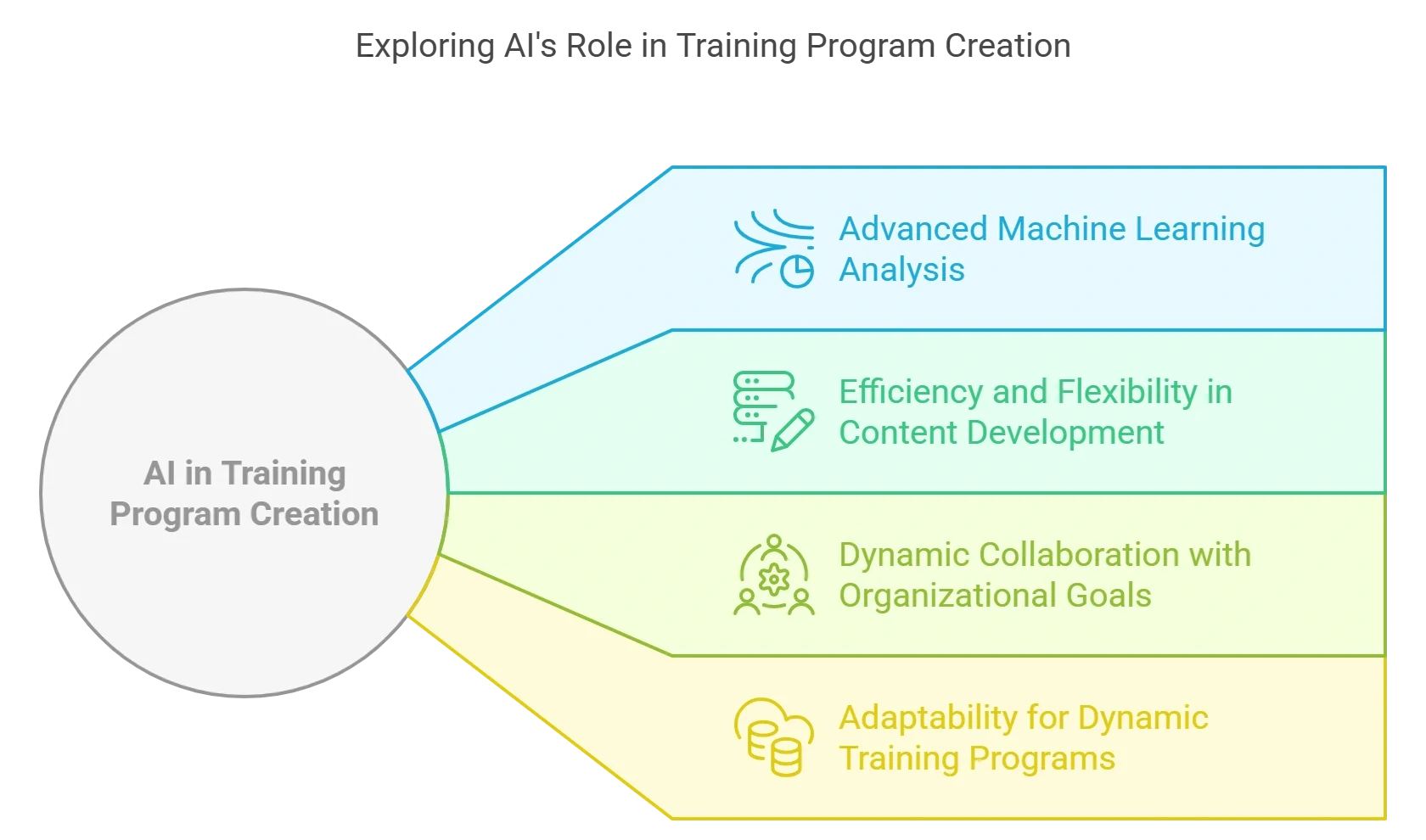
Can AI Create a Training Program?
Exploring the transformative capabilities of AI in designing comprehensive training programs uncovers its nuanced approach and dynamic impact on professional development:
1. Advanced Machine Learning Analysis
AI systems utilize advanced machine learning algorithms to conduct nuanced analyses of existing training materials. They identify gaps and create new information with surgical accuracy.
2. Efficiency and Flexibility in Content Development
The content development method powered by AI is efficient and highly flexible. Customization of content to individual learning styles and evolving workforce needs is a hallmark of AI-driven training programs.
3. Dynamic Collaboration with Organizational Goals
AI-powered professional development platforms act as dynamic collaborators, seamlessly merging with organizational goals. Automatic real-time adjustments to training materials ensure continual relevance in response to the ever-changing demands of both the workforce and the organization.
4. Adaptability for Dynamic Training Programs
The adaptability of AI guarantees that training programs are dynamic, evolving systems. These programs breathe in tandem with industry trends and organizational strategies, ensuring continual alignment.
Moreover, AI’s role extends beyond content creation. Intelligent algorithms’ automated assessment and feedback processes redefine the training paradigm. In real-time, AI evaluates employee performance, providing nuanced feedback on strengths and areas for improvement.
This immediate feedback loop not only accelerates the learning curve but also cultivates a culture of continuous improvement, fostering a dynamic and resilient workforce capable of swift adaptation to changing professional landscapes.
Read This Exclusive Whitepaper: AI-Powered Learning – Transforming Employee Training Across Industries
Final Thoughts
As tech continues to revolutionize the field of AI in learning and development, equipping learning professionals with a deep understanding of key AI concepts is paramount to unlocking its full potential.
Therefore, by being proficient in machine learning (ML), deep learning (DL), and Natural Language Processing (NLP), among other foundational ideas about artificial intelligence (AI), teachers will be able to design life-changing educational experiences that empower learners while catalyzing a company’s growth, thus shaping future education.
Embracing ethical principles, prioritizing data privacy and security, and fostering a culture of continuous learning and adaptation are essential pillars for navigating the AI-powered learning landscape with integrity, responsibility, and innovation.
Whether you’re looking to enhance employee training, optimize educational content delivery, or elevate learner engagement, Hurix Digital‘s cutting-edge technology and expertise empower you to achieve your goals with confidence.
From customizable learning platforms and interactive content authoring tools to AI-driven analytics and personalized learning experiences, Hurix Digital offers a comprehensive suite of solutions tailored to your organization’s unique needs. Join hands with us to revolutionize learning and unlock the full potential of your workforce.

Senior Vice President
Julia brings over 20 years of global experience in digital learning and business strategy. She specializes in client success, enterprise learning solutions, and driving growth through innovation, with a focus on AI, VR, and emerging technologies across diverse industry verticals.

